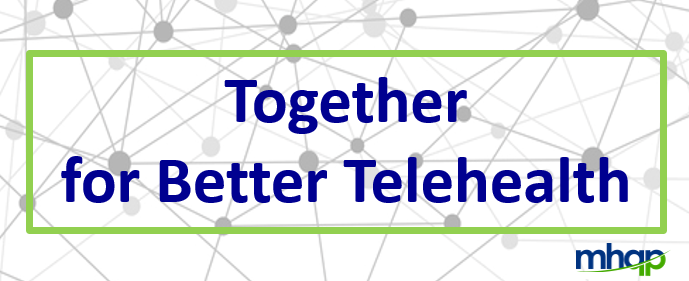
Telehealth Survey Results
Insert opening narrative here. Lorem ipsum dolor sit amet, consectetur adipiscing elit, sed do eiusmod tempor incididunt ut labore et dolore magna aliqua. Ut enim ad minim veniam, quis nostrud exercitation ullamco laboris nisi ut aliquip ea commodo consequat.
Lorem ipsum dolor sit amet, consectetur adipiscing elit, sed do eiusmod tempor incididunt ut labore et dolore magna aliqua.
“It takes years, not months for a med student to learn how to conduct an exam. It will require months, not days for clinicians to learn how to do this well remotely.” – Physician
(Question 1) What have you lost by not being able to see your patients in person?
(Question 2) How have you tried to make up for that loss?
Read what some clinicians are saying about…
“I acknowledge with children and families the reality of the situation… In the case of the children, if this is a child I see with some regularity, I assure the child that the re will come a time when we will be back to together again in the same physical place soon.”
“I often ask to speak with a spouse or adult child to touch base with them, particularly if patient [is] demented or hard of hearing.”
“Yes trying to get as much information from the patient by instructing them how to physically check things in their bodies! Had a sick patient with covid who I had lie down do I could count his respiratory rate by watching his abdomen he was on. Vent the next day as I insisted the day of the telehealth visit that he got to the hospital!”
“Try to spend time asking them what their life is like in the new world.”
“Paying even closer attention to facial expressions.”
“Frequently in touch with patients.”
“Developed some covid services – depo shots – set up two injection clinicics, lab drop phlebotomy clinic.”
“Trying to be conservative in clinical decisions – as mindful as possible that [there is] missing information.”
“Seeing huge disparity in ENG speaking and non English speaking access to TH at outset. Not technology based, rather the outreach has been in English and not hit the communities of other languages. More evolving strategies needed. SDOH comes into play, but everyone should be able to get access.”
(Question 3) What is a moment that surprised you about how well telehealth worked?
moments that surprised them when things worked well.
“Many older patients able to do some kind of face time – very few can do Zoom through EPIC.”
“Even though I was already quite familiar with Zoom for connecting with colleagues, I was surprised that it didn’t take long for families and children to become comfortable with the platform and the technology.”
“I had a follow-up appointment with a family and their toddler for whom an earlier evaluation had resulted in an autism spectrum diagnosis. I was following up to monitor progress. I was quite amazed and thrilled that I was able to assess and witness his progress by interacting with him through Zoom, playing peek-a-boo, giving direct eye contact, having a social exchange, etc. What was so thrilling about it is that this was diagnostic, the fact that he was able to interact with me on the computer.”
“The main positive of TH is that patients who don’t know what meds they are on can go to the medicine cabinet and report accurately drugs and doses.”
“Sometimes, if a family member answers the phone, I can learn from the family, and that is really helpful. For example, I was introduced to a patient’s daughter, and that was very helpful.”
“It’s been also very helpful when [patient] and family member are able to join visit – video gives a sense of the dynamics and look at the living space.”
“A video visit with a 95 year old patient who just got out of the hospital!”
“Talking with a patient the morning his wife died (also my patient).”
“How happy the patients are to be connected with us.”
“When patients express how safe and cared for they feel by being able to access healthcare this way. When patients who may otherwise feel unsafe leaving their homes, especially [gender affirming hormone therapy] patients, verbalize how thankful they are to have TH availability.”
“My transgender patients feel infinitely more comfortable having telehealth appointments because it allows them to relax more in the setting of their choosing. All of my patients have felt this way, but my transgender patients especially because accessing healthcare can be traumatizing for them.”
“Some paternalism in medicine removed / removed barriers to access to easy [treatment].”
“Been really nice – had a young woman with chronic pain with lots of no shows. Started more frequent video visits the solution presented to pt and she grabbed it and is doing well. The video visits worked for her to get ongoing care.”
“Visits go smoother and quicker. Patients have less time waiting for the clinician to see them.”
“Honestly – you gleemed attitude was way overdue. Whole system. It took a pandemic to make it happen. What’s cool – if everything was capitated – covid would not have made a difference. Aligned with service needs.”
“[I have] been surprised at all the challenges in logistics and technology. Even little things: Phones die. During a visit somebody shows up at the door – there goes 12 minutes of the visit.”
(Question 4) What have you learned about yourself as a clinician using telehealth?
things they've learned about themselves.
“I’ve confirmed that necessity is the mother of invention. If you had told me a few months ago that I would be able to conduct a meaningful clinical encounter on Zoom, I’m not sure I would have believed it. When necessity forces us to try new things, what felt initially like a burden and source of potential frustration forced me to think and be more flexible and to use the platform as creatively as possible – taking advantage of all the opportunities that the ability to connect this way gives me.”
“It’s been comforting to know that we can pivot to something new in the profession. Reassuring that the profession is nimble enough to do this. As a collective able to stand up to this challenge. Surprising, but getting this done.”
“That I am a creative thinking person and can rely on skills other than just exam to assess a patient.”
“[I like] the clinic, the people, the camaraderie. Many primary care clinicians enjoy the clinic – if [we] have a bad experience [we] can speak with colleagues. Rough to do this one after another without the colleagues.”
“Really like seeing patients in person. Don’t like working from home. Like contact with people in the office. Very clearly if this is how medicine is going for the next 3-5 years she’s out. Can’t do this. Seeing patients in person is where it’s at. Can tolerate a little telehealth.”
“that I like the human contact and being able to be in the same room with my patients, allowing for small talk sometimes…which helps me be a better physician.”
“People are more able to open up when in comfortable surroundings.”
“Patients super, super grateful. Don’t have an expectation that they will do this staff. When patients come [in person] all kinds of hassels (travel, parking, late,ins hassles).”
“How much I rely on history (even in the office) for management.”
“Biggest thing it takes a long time to learn to examine and interact with a patient in a new way. If you ask any med student to learn how to conduct and exam – it is years not months. It will require clinicians weeks not days to learn how to do this differently. To make this clinically meaningful will require some significant retraining of mid career docs.”
“I have an enormous data bank of knowledge and experience that crosses many disciplines.”
“That I’m a good interviewer.”
“I’m cautious to think about this as “new.” We’ve been using the telephone for a century and have already developed these skills.”
(Question 5) What would you like to learn from other clinicians about telehealth?
what they want to learn from other clinicians.
“How are they doing developmental assessments in an efficient manner?? In the home. What are some validated things you can ask to see?”
“I would like to learn from other clinical psychologists who are in the practice of facilitating psychological evaluations. What kinds of experiences and success and challenges have they encountered with trying to move assessments and evaluation testing techniques and procedures online?”
“Can you compare your practice style and interaction with patients before vs. now?”
“And I would like to know from the clinical fields in general whether engaging in telehealth through an online platform has been able to reach all families across diverse economic circumstances and what they’re doing to ensure equitable access to quality care through devices.”
“Need to solve for patients who don’t always have good phone/internet.”
“Key is more how are people going after the gaps – leveraging this to be as robust as possible?”
“How is TH fundamentally increasing efficiency? How do you incorporate existing into TH visits?/ Staff being furloughed but will need them. What is the right balance while trying to adapt to this change. Why are you having people in the middle you don’t need? What is thinking? How are practices incorporating change management?”
“How do you find the truth (when you are fooled by a patient)?”
“Do you believe there is a difference with how you interact with a patient in video vs telephone only?/ How important is the video piece with patients and clinicians?”
“How are you selecting appropriate patients for telehealth vs face to face in a consistent manner?”
“How happy are you with your TM platform EHR? How many platforms have your tried/changed?”
“How other sites are providing care for PTS without going to TH? EG – pick up prescription, and you ask a question to pharma; they say call your doctor – this will take a long time to get an answer. An opportunity to provide pts the whole continuum vs TH.”
